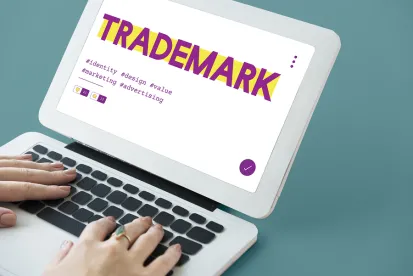The basic premise that a generic term is un-registrable is, at first glance, uncontroversial. If a key purpose of a trademark is to identify a particular source of goods or services, then it stands to reason that one cannot obtain a trademark registration for the name of that very category of goods or services. For example, it’s unlikely one could register the mark “Books” for a bookstore, or “Groceries” for a supermarket—doing so would effectively grant the owner a monopoly on the use of those very terms. But what if those ostensibly generic terms were part of a website domain?
The Supreme Court recently addressed this question in USPTO v. Booking.com,1 rejecting the U.S. Patent and Trademark Office’s contention that the addition of “.com” to a generic term was inherently a generic composite itself. Previously, the PTO had rejected attempts by the respondent, which operated a travel-reservation site of the same name, to register a number of marks incorporating its name, finding those terms no less generic than the term “booking” itself. The Court, with Justice Ginsburg writing for the 8-1 majority, disagreed. Why? After all, as the PTO noted, the Court long ago held in its 1888 decision Goodyear’s India Rubber Glove Mfg. Co. v. Goodyear Rubber Co.2 that simply adding a generic designation such as “company” to a generic term could not create a protectable trademark.
The Court distinguished the Goodyear Rubber decision on several grounds. For one, a “generic.com” website could convey an actual source-identifying characteristic to consumers: the particular Internet domain itself. In other words, the use of a “.com” designation could be understood to refer to a specific business—and its exclusive online address—in a way that “Company” or “Inc.” could not.
Second, the Court rejected the PTO’s reading of Goodyear Rubber as holding “Generic Company” marks were ineligible for protection as a rule (noting the PTO had already granted a number of registrations for marks in the “generic.com” format). Instead, whether “generic.com” marks were themselves unregistrable depended on whether consumers actually perceived them as generic—referring to the category of goods or services—rather than as a term “capable of distinguishing among members of the class.”
Although the PTO contended that permitting registration of “generic.com” marks would inhibit competitors from using generic terms, the Court disagreed, finding that “generic.com” marks, like other descriptive marks, will receive only narrow protection.
So what does this mean for businesses? The Court’s observation that “generic.com” marks will face the same limitations as descriptive marks would seem to temper concerns about unforeseen anticompetitive consequences. Gaining protection for such a mark will be more difficult and costly than a fanciful or arbitrary one in that markowners will need to show their marks have acquired secondary meaning, or what the Court described as achieving significance “in the minds of the public” as identifying the source of the goods or services. But could this lead to, as Justice Breyer’s sole dissent feared, “a proliferation of ‘generic.com’ marks, granting their owners a monopoly over a zone of useful, easy-to-remember domains”? For any entrepreneurs looking to capitalize on this new holding, the answer is likely no: while generic terms may not be registrable at the PTO, the corresponding internet domains have nonetheless long been recognized as valuable and were registered years ago. Take any “generic.com” domain name that comes to mind and you may find it already in use or redirecting to related businesses with their own established marks.
Nevertheless, this holding means that there are already a number of owners of countless, largely underutilized “generic.com” domains, businesses and otherwise, who may now find themselves in possession of a potentially valuable mark they can invest in. Such an investment would likely have to be a significant and long-term one. The owner of a descriptive mark seeking the full benefits of Principal Register registration will have to extensively promote the mark—likely for years—to acquire secondary meaning, while tasked with the enforcement of a mark likely to encounter reoccurring similar third-party uses. While we may not see overnight successes spring up following the Court’s ruling, the years ahead are likely to see the rise of such marks and ensuing litigation as a result.
[1] United States PTO v. Booking.com B.V., 591 U.S. __[? Add number], LEXIS 3517, 2020 WL 3518365 (June 30, 2020).
[2] Goodyear’s India Rubber Glove Mfg. Co. v. Goodyear Rubber Co., 128 U.S. 598, 9 S. Ct. 166, 32 L. Ed. 535, 1889 Dec. Comm’r. Pat. 257.




 />i
/>i
